Poll of the Week: Are disappearing messages really safe?
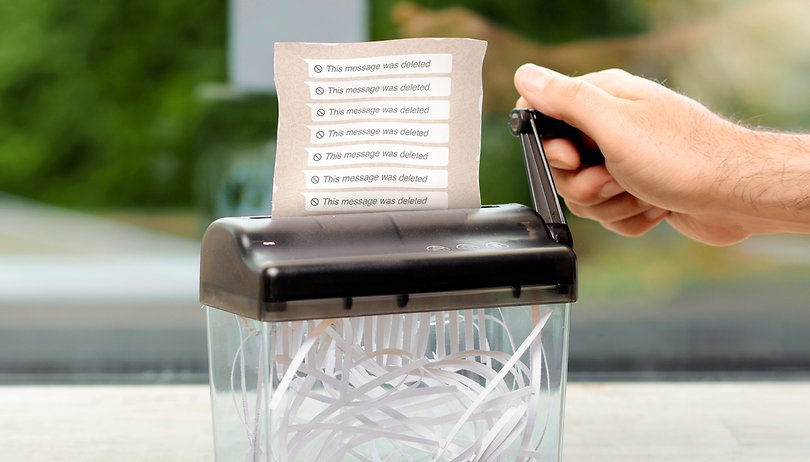

Read in other languages:
So 2021 was the year that WhatsApp finally took disappearing messages seriously. Adding a feature that most of its alternatives have been offering for a while now. But are people really using the feature? And most importantly, do they really trust it to share confidential and/or private information? Well, at least among the NextPit Community, it doesn't seem to be the case.
The Community prefer regular messages
To begin with, when asked which kind of messages they prefer, the NextPit Community voted mainly for the "normal messages" answer — those that do not disappear automatically. And one of the main reasons seems to be that of trust. Not only on the service providers — WhatsApp, Telegram, Signal, etc. —, but also on the other party.
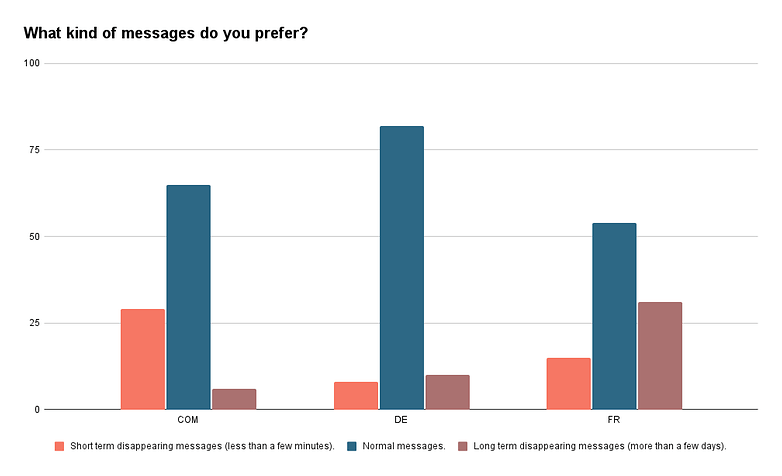
I have never used this ephemeral message function in my entire life and I admit that the idea would not even have come to me to do so. Either I write to someone who is reliable, or I feel that the person is not, and I adapt my mesage according to this criterion. Because ephemeral message or not, the person in front can take screenshots or photograph his screen if the capture function does not work for one reason or another. This ephemeral message function would not reassure me at all.
Jerome69Paris, French Community.
Tim, at the German website, noted that platform owners could theoretically save those messages, and the same could be said for ISPs, and other parties, but with the added hassle of having to fight the app's encryption.
It should be noted that while the normal messages option won in all of NextPit's domains, in the French website, the sum of short and long-term ephemeral messages almost tied with the most voted option.
Privacy matters
As for why people use disappearing messages, the most common answers to last Friday's question were the general sensation of privacy — which actually led the answers in the French poll —, followed by sharing critical information and explicit content.
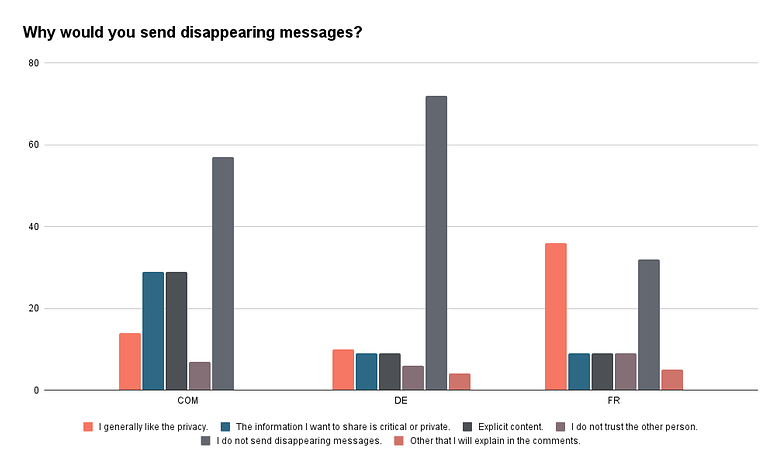
Despite questioning the effectiveness of written messages, French reader louis hory mentioned one interesting use for disappearing messages:
[...] the more or less rapid deletion of messages can avoid inconveniences that can sometimes be encountered in our classic oral exchanges.
The transparency that makes it possible to bring back all the content of our written exchanges can also cause damage, forgetfulness is sometimes necessary to maintain peaceful relations...louis hory, French Community
And if the answers from our German readers in both questions already didn't make it clear, not only disappearing messages can offer a false sense of privacy, but can also be abused in unwanted ways, something that was cited by more than one reader.
I don't see a solution to a problem with self-deleting messages and I don't find it innovative. A message is a message and I see no reason why it should automatically delete itself. If you don't want to share something, you just don't.
I rather see problems here if, for example, someone receives hate messages all the time that delete themselves and the person cannot prove that they are being bullied.King Frank, German Community
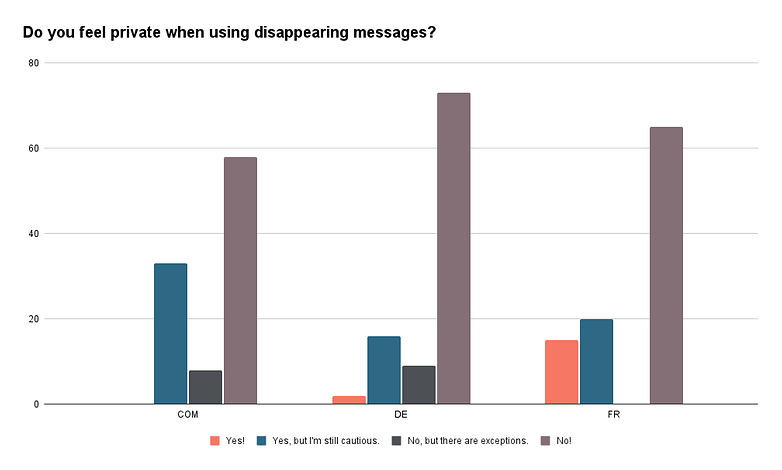
Finally, when asked if they felt private using messenger app's disappearing messages features, most of the readers voted for a clear "no", echoing the majority of answers from the questions above — and most of the comments as well. In a distant second place came the "yes, but I am still cautious" answer, with a total number of votes about three times lower than the most voted answer.
Just before closing this analysis, we will simply quote Pat's answer:
I believe that anything you do on the internet, whether emailing, or commenting on a message board, is there for someone to find or see forever. I also don't have any faith in any information that is said to be disappeared. Destroyed might make me feel better, but only a little.
Pat, International Community
And that's it for this weekend's poll. We will have another poll this Friday, just in time for Christmas. Feel free to share your opinions about this week's poll and results, and be sure to join us again next time!
Original article
Disappearing messages are right now one of the hottest features that all messenger platforms strive to get right. WhatsApp has recently taken steps to expand this feature. But do users enjoy using this function? Or are disappearing messages an inconvenience we have to bear with? The answers may not be as clear-cut as I would like them to be, so I am tossing the question to you, NextPit readers!
Privacy in the digital world is, in my — not so humble — opinion, the most critical point of our interaction with technology. We live in the era of information after all, and many of us are live-streaming our life in textual form that is then stored in some far-far away server. I'm not sure about you, but this idea can cause plenty of frustration to an average Joe like me.
It is not like I understand how complicated encryption work, but if some piece of information about me is stored somewhere, no matter how good the encryption is, someone someday will be able to break it. Then there is also the much more immediate danger of interacting with other humans in the virtual world, which I believe would be a waste of lines to present. We are simply living it every day.
Disappearing messages: Humanizing texting?
The solution to all these concerns is simple. What if we replicate the privacy of real-life interactions in the virtual world? To repeat this in the digital world is pretty simple: Set a timer for messages, and as soon as the timer expires, they disappear. With all factual evidence gone our communication maintains the same feeling of uncertainty and privacy we have in real-world interactions.
The truth is, communicating in the real world is more challenging than one would initially imagine; Any kind of communication that does not include some type of recording exists in the memory of those who participate in it. In a sense, it becomes your word versus mine, which makes our discussions safer.
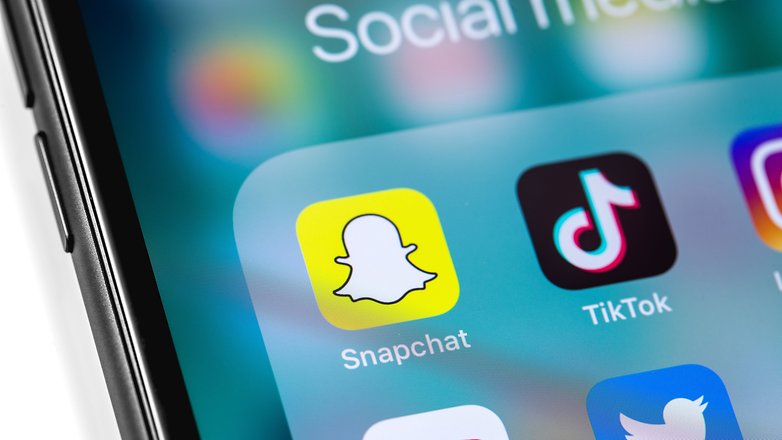
But, for all our mental majesty, we are very limited. Communication can be challenging when your only reference is your memory. After all, we are bombarded with information more than ever, and everything is striving for our attention. Today, we are expected to remember more details with greater accuracy than ever before.
At least personally, I've come to rely so much on the record-keeping abilities of texts that if someone sends me a self-destroying message, then it is very likely to forget it after three minutes, causing great confusion in follow-up discussions. But then again, this happens in real life too, so in a sense, I would say that disappearing messages humanize, with all the pros and cons that this brings our virtual lives.
So there is the convenience of standard messages that we can always refer to, which allows us to connect further with more and more people. Then there is the safety of disappearing messages, our right to privacy respected.
But this is not all; It is evident that, as with all features, there is a right way to do them and a wrong one, and different platforms try to find a balance in their own way.
Different platforms have different audiences. Some companies utilize disappearing messages for critical information to ensure that leaks are kept to a minimum. At the same time, individual users may want to use it to entrust very sensitive secrets to friends and family. Others may enjoy the privacy of knowing that nobody can keep a record of their messages. So when it comes to you, why would you use disappearing messages?
But can this poor presentation of a very complex subject spark a proper discussion without a good dose of doubt? Can we actually "humanize" anything in the virtual world with our current tools; Or are we just fooling ourselves with cheap solutions like disappearing messages that provide us a false sense of security that make us more reckless, often to our demise?
Hell, in an ideal world, I wouldn't have to bring this point up, but we do have an article dedicated to how to bypass the safety of disappearing messages, so there is a danger to our privacy, our right to be forgotten, and all the things I discussed above to be of zero actual value.
So with that knowledge, that the person on the other side of the screen could potentially record things, does it nullify the purpose of disappearing messages?
Of course, there are a lot of subjects that we did not touch in this poll; This subject is apparently more complicated than it seems. There are also serious security and policing aspects to it that I have avoided discussing, but I figured that such concerns would fit better in the comments! So I'm looking forward for your input!











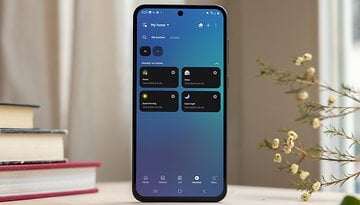








I believe that anything you do on the internet, whether emailing, or commenting on a message board, is there for someone to find or see forever. I also don't have any faith in any information that is said to be disappeared. Destroyed might make me feel better, but only a little. I never put anything in an email that I worry about anyone else seeing.